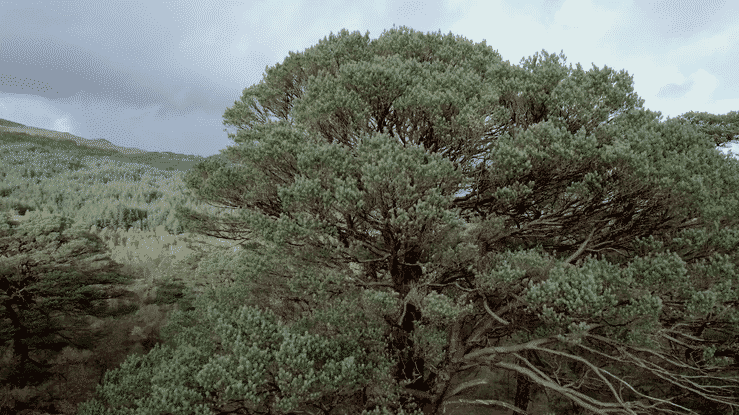
Mar 29, 2023 Reducing Deaths And Anxiety: Why Trees Should Be Cause Célèbre For Our Health And Well-Being
It has been a year since my neighborhood journey into “standing up” for trees began. It started as so many things do for me these days, on a dog walk.
My rescue companion, Duke, and I were walking across the woods and farmland when we came across the unedifying sight of chainsaws hacking down a dozen or more trees that had divided two farm fields for the trees’ lifetimes. The trees included oaks and beech trees that provided a welcome windbreak, held the soil together, and offered protective habitat for the local wildlife.
The felling team was in a hurry. I watched as one of the chainsaw-wielding workers ran to make the next cut. Locals were near to tears. The onlooking landowner remarked, “It’ll look bl**dy lovely when they’re gone.” And soon, they were gone, leaving another larger field where an intensive farmer could farm more intensively.
The resulting controversy saw me appointed by the Parish Council as its first honorary tree warden. I have since been mapping out trees that may be good candidates for a TPO – Tree Protection Order. I watch for local felling applications, maintain a dialogue with the local Forestry Commission, and have published a briefing on ‘How to Protect Trees in our Parish.’
My portfolio of causes continues to broaden.
I have realized that a healthy future depends on joining the dots and seeing how things fit together. Trees are a perfect case in point.
A new study in The Lancet reveals how planting more trees in cities could cut deaths from the summer heat. High city temperatures can seriously affect our health, causing cardiorespiratory failure, hospital admission, and premature death. Having looked at urban tree coverage in 93 European cities, an international team of scientists calculated that doubling such coverage would cool cities by about 0·4 degrees centigrade, reducing heat-related deaths by 39.5% and saving more than 2,500 lives.
Trees provide health benefits beyond simply cooling urban spaces. An innovative 2019 study in Denmark reported that exposure to high levels of green space in childhood was associated with a lower risk of experiencing a broad spectrum of psychiatric disorders later in life.
Planting in Cities
Urban tree planting is becoming more urgent as fluctuations in extreme temperatures become more frequent due to climate change and as studies show that exposure to greenery is vital for human health. Protecting and planting more trees in our locality is in all our interests. We rightly criticize the destruction of rainforests in countries far away, yet deforestation closer to home often goes unnoticed. Across the UK, a staggering 14 percent of tree cover has been lost in the last two decades.
In Peril
Scotland has the most tree cover in the UK, but its globally unique Caledonian pinewoods are on a “knife-edge,” according to a new study by Trees for Life. The study, the first of its kind for 60 years, shows that the remaining pinewoods are in danger of being the last generation in a line stretching back to the last ice age.
Characterized by Scots pine trees, the Caledonian Forest of the Highlands used to be a vast wilderness, home to great herds of grazing animals preyed upon by lynx, wolves, and other predators. Only 2% of that forest remains after centuries of deforestation. The spread of non-native trees, overgrazing by deer, and rising temperatures due to climate change threaten the remaining ancient forest.
Ecologist James Rainey, who led the study, told the BBC, “These pinewoods should be playing a key role in Scotland’s fight-back against the climate and nature emergencies, but right now, most are on their last legs. It’s not too late to turn this around, but that means seriously stepping-up restoration and rewilding action “.
Community Action
Considering the once mighty Caledonian forest in Scotland, the dense tree canopy of the Amazon far away, or the stands of trees in our local communities, all trees matter.
In protecting trees in the UK, it is essential to know that a felling licence from the relevant government authority may be required before anyone can cut down trees. Some exceptions apply, but cutting down trees without the appropriate local authority’s permission is often an offense. Licensing measures for tree felling are not new; they have been in force for 50 years. Yet, despite these measures, trees remain vulnerable to casual and unsympathetic felling.
Preserving trees is increasingly recognized as hugely important for our future happiness and well-being. Concerned citizens can play a significant role in looking after our natural heritage trees by being their eyes and ears, looking out for their best interests and thereby creating conditions for a better future at both local and global levels.
Philip Lymbery is the CEO of Compassion in World Farming, an international farm animal NGO headquartered in Godalming, Surrey, in southern England.
Note: A version of this blog was first published in The Scotsman on Monday, 13th March 2023.


